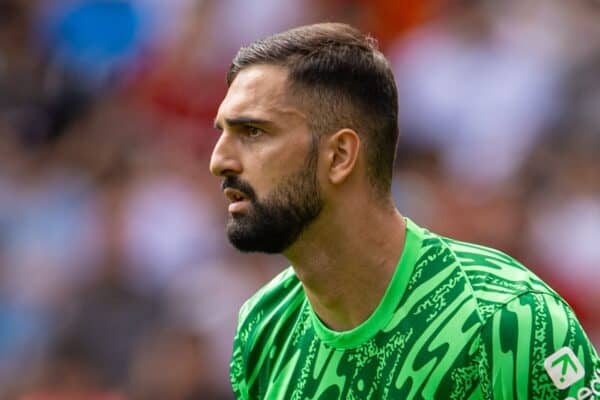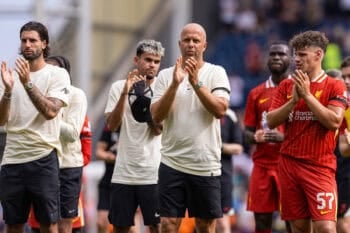In football – and in life – it is fascinating to watch transformations occur before our very eyes, as one element morphs into another often until it is completely unrecognisable. It’s what drives us forward: this constant sense of change underlines everything about us. It’s not only inevitable, but essential, and it’s something we can all relate to.
Whether you’re talking about the process of maturation or developing a set of skills; whether you’re referencing the perceptions of individuals or a collective mindset – it doesn’t matter. It’s all prone to change. You may one day be on top of the world – your fall from grace is likely to follow. On the flip-side, if you’re at your lowest point, you know there’s only one way to go: up. Evolution is what defines us as a species.
Such a sensational portrayal may seem a little overdramatic, but bear with me – because it only seems appropriate that such sweeping imagery be used to describe the newly-crowned Player of the Season at one of the world’s biggest footballing institutions: Lucas Leiva.
Certainly, if there’s one person that deserves such a majestic response in a season that has been as trying as this, then it is Lucas.
More than anything else, Lucas embodies this idea of transformation in every single way. His time at Liverpool so far has already seen him witness the dramatic highs and lows that would be enough to satisfy any career: indeed, I’ve no doubt that a lesser player – and a lesser man – would by now have succumbed to the low points that he has been forced to endure. But he has come through the other side unscathed, and this season’s trophy – unfortunately, the only one in his collection thus far – is a testament to the character and determination he has shown over the years.
Lucas’ Liverpool career began, of course, in mediocre fashion, as the much-maligned player was subjected to a plethora of mistreatment and abuse. And thus the young man from Brazil, trying desperately to incorporate himself into a new culture – both on and off the pitch – underwent his first major transformation: he unjustly morphed from a promising young player into an unmitigated scapegoat. Everything that went wrong with the team was through a fault of his, whether it was a goalkeeping error or a lack of incisiveness in the final third; even completely unrelated errors were traced, somehow, back to the young midfielder.
That’s not to say that he didn’t hold his fair share of the blame. He certainly wasn’t a perfect player; he was far from the finished article. Like any player, he was prone to mistakes. It just so happened that he made a few high-profile errors. More than anything else, he was simply in the wrong place at the wrong time: it could have happened to anyone.
But the transformation from a majority of the fans was uncalled for – for it became popular to cast Lucas in the role of the villain. It became all-too-easy to let frustrations out on a young man who would have been equally frustrated at his role in several key defeats; a young man who wouldn’t be blamed for being close to tears at the thought of the fans turning against him in such unadulterated fashion. Lucas simply is not good enough for this club was the cry. The man who put him in the spotlight – who believed in him – was labelled increasingly stubborn for having the nerve to defy the fans week after week with his inclusion. And this collective mindset, once it is in full swing, is nigh on impossible to change.
And perhaps because of this alone, Lucas deserves the highest form of praise: for change them he did.
While his descent into the role of scapegoat was hasty and swift, his evolution into a fan-favourite took much, much longer. Indeed, there may be some fans out there now who he is yet to truly win over. But that majority – the same fans who once berated him – is now marching to a different tune. Because somewhere along the way, that collective mindset transformed. From being the popular scapegoat, it became fashionable to support Lucas; he became everyone’s new starlet – and won the Young Player of the Season award last year. Fans who were quick to condemn him the first time round became eager to renounce their previous hatred; to pretend it never even happened. I’ve supported him all along, even when it wasn’t popular, they will say. Maybe. That can’t be true for everyone. But it’s alright – because change is natural.
Of course, only one man can be credited with inspiring this conversion in attitude: Lucas himself. Having such a burden to carry on his back may have broken the majority of other players. Certainly, Lucas could’ve gotten out at any time had he wanted to: he could have quit, sought a transfer elsewhere, started afresh. But if we’ve learned just one thing by now, it’s that this attitude is not in the Brazilian’s DNA. The last thing he will do is give up.
So he gritted his teeth, got his head down and worked harder than ever before – and week by week, the improvements began to show. He began cutting out the clumsy mistakes that had gotten the fans on his back in the first place. He began to show his true qualities; his excellent reading of the game, his reliance upon speed of thought over speed of foot. And above all, he began to show the consistency that is now a hallmark of his – week after week, he would provide the same level of performance, no matter what stood in his way.
And in a season riddled with inconsistencies and transformation, Liverpool have reaped the subtle benefits of having someone dependable in the centre of the park.
But Lucas himself has admitted that his evolution has been about more than football. His growth as a player into a confident, consistent performer has mirrored his personality off the pitch; his sense of character and determination, and his unquestionable attitude. And more than anything, it has reflected his growth as a person. Not only has he gone from being a young lad seeking to acclimatise himself with a foreign culture to being a confident, spirited man with the world at his feet, but this year he became a father for the first time. The bold, passionate man he is today is a far cry from the timid youngster we were introduced to a few years ago.
What does he credit with this personal and professional development? The very same criticisms that were levelled at him at the start of his career. They taught him to develop an unshaken belief in himself and to acquire the mental toughness playing at the top level requires. Ironically, without the heavy condemnation he received, he wouldn’t be the player he is today.
So one can’t help but feel that in Lucas there is something of the ultimate role model.
But aside from this, what lessons can Lucas teach us for the future? Perhaps it’s to have similar belief in young talent with potential; to give them the benefit of the doubt and to support them through their development, even if it means overlooking a mistake or two. Or maybe it’s to criticise them more than we ever have before in the hopes of inspiring a similar level of improvement, weeding out those that don’t possess the attitude and spirit it requires to make it. Who knows?
The one thing that is certain by this point is that after a stellar season, Lucas deserves all of the praise that he is surely in for. His career has been quite a ride so far, but it’s not over yet – and that can only be a good thing. He may not be the flashiest player, and it may be rare for him to directly influence the outcome of a game – but he plays an essential role in a squad that can only improve from here. For me, his attitude is second to none, and so long as his trademark consistency remains, he should be the first name on the team sheet for seasons to come. What’s more, if Liverpool can acquire more players with the determination and passion he shows week after week, then number nineteen shouldn’t be too far away.
For years, a famous song that has reverberated around the Kop has gone we all dream of a team of Carraghers. Me? I dream of a team of Lucas’s.


















Fan Comments